As San Lorenzo kicked off Thursday’s Copa Libertadores decider against Cerro Porteño in Asunción, their president might be forgiven for not having had his mind wholly on footballing matters. For the last two months Matías Lammens has juggled a punishing schedule focused on two fronts: his duties at the helm of one of Argentina’s biggest, most demanding sporting institutions – and his campaign as a candidate to be the next mayor of Buenos Aires City.
Lammens is running on the Peronist ticket of former Cabinet chief Alberto Fernández and expresident Cristina Fernández de Kirchner, who hope to unseat Mauricio Macri in the presidential elections that start next Sunday with the PASO primary vote. While polls suggest the Fernández duo hold a slight lead over the incumbent, Lammens’ task may be somewhat more complicated as he tries to end 12 years of PRO hegemony in the Argentine capital and defeat current Mayor Horacio Rodríguez Larreta.
Why then, should the good citizens of Capital Federal turn away from the PRO and vote for the San Lorenzo chief, by all accounts a political novice? Lammens, like Macri himself before him, aims to use his positive record with the Bajo Flores club as a springboard for success.
Alongside media heavyweight Marcelo Tinelli, his vice-president and principal source of funds for much of the project, the 39-year-old lawyer has been in charge at San Lorenzo since 2012, overseeing an almost complete transformation in the club’s fortunes. He can count amongst his achievements the Cuervo’s firstever Copa Libertadores title in 2014 and several other major titles, as well as the tireless campaign for San Lorenzo to return to their spiritual home of Boedo that bore fruit earlier this year with the official restitution of the land previously occupied by the stadium. For the last three decades it had played host to a Carrefour supermarket.
Under the watch of Lammens and Tinelli, San Lorenzo have also vastly increased their membership base and poured money into grassroots activities and non-football sports, most notably basketball, with the team winning the last four National Leagues and back-to-back continental titles. They were additionally the first club to commit to the professionalisation of their women’s team, signing the figurehead of the struggle, Macarena Sánchez. But Lammens’ administration has also attracted its critics, with a suspended sixpoint deduction for accounting irregularities at the start of 2019 suggesting that the Cuervo’s finances may not be in such rude health.
The candidate’s football background, of course, is hardly a novelty. Macri used his trophyladen time at Boca Juniors to launch himself in City and later national politics, while current mayor Larreta is a fervent Racing Club fan – his father, also named Horacio, was briefly president of the Avellaneda club in the 1970s and was detained by the militar y dictatorship. Larreta’s vice, Diego Santilli, is another that maintains close ties to the game, as the son of former River Plate chief Hugo Santilli and the brother of current Millonario director Darío Santilli.
But while Macri entered politics on a centre-right, businessfirst platform, and both Larreta and Santilli started on the right wing of peronism before migrating to PRO, Lammens cuts a rather different figure. An admirer of Fidel Castro and Che Guevara’s Cuban Revolution – as a young man in 2001 he spent six months studying in the Caribbean nation – and an outspoken supporter of the right to legal abortion and a declared agnostic, his progressive views stand out in contrast to the social conservatism of both Macri and Larreta and indeed many in his own electoral front. On a regional level he sympathises with former president of Uruguay José Mujica while condemning both Brazil’s Jair Bolsonaro (“It scares me that a guy like that is president,” he has said) and Nicolás Maduro in Venezuela.
Lammens’ campaign, unsurprisingly, is centred on the lack of reaction from local authorities in the midst of the economic crisis that started nationally in 2018. “The porteño government abandoned the people, they should have had some sort of counter-cyclical policy to stop the residents of Buenos Aires being harmed by the economic crisis,” he fired in a recent interview to Infobae. “The drop in consumption statistics is due to the middle classes having stopped consuming, and they stopped consuming because they have no money in their pockets, because they struggle to make ends meet.”
It is doubtful that Lammens’ energy or the general economic malaise hanging over Buenos Aires will be enough to propel him to the mayoral seat. Next Sunday at least he is all but guaranteed to finish second in the primaries, with the margin of defeat the only variable likely to deliver hope for Lammens ahead of the first round of voting proper on October 27. A strong result, though, would nevertheless leave the young San Lorenzo chief well-placed to establish himself as a real contender in the capital in the years to come, just as Macri bounced back from initial electoral defeat in 2003 to win four years later.
In football as in politics, after
all, no matter what the last result
a new game is always looming
on the horizon.related news
















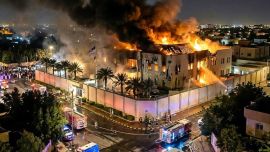
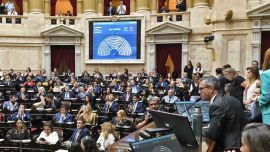
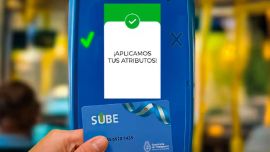
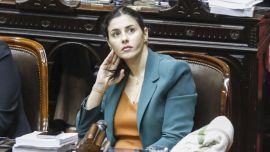
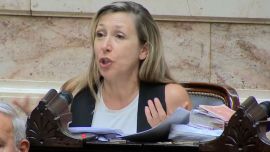
Comments